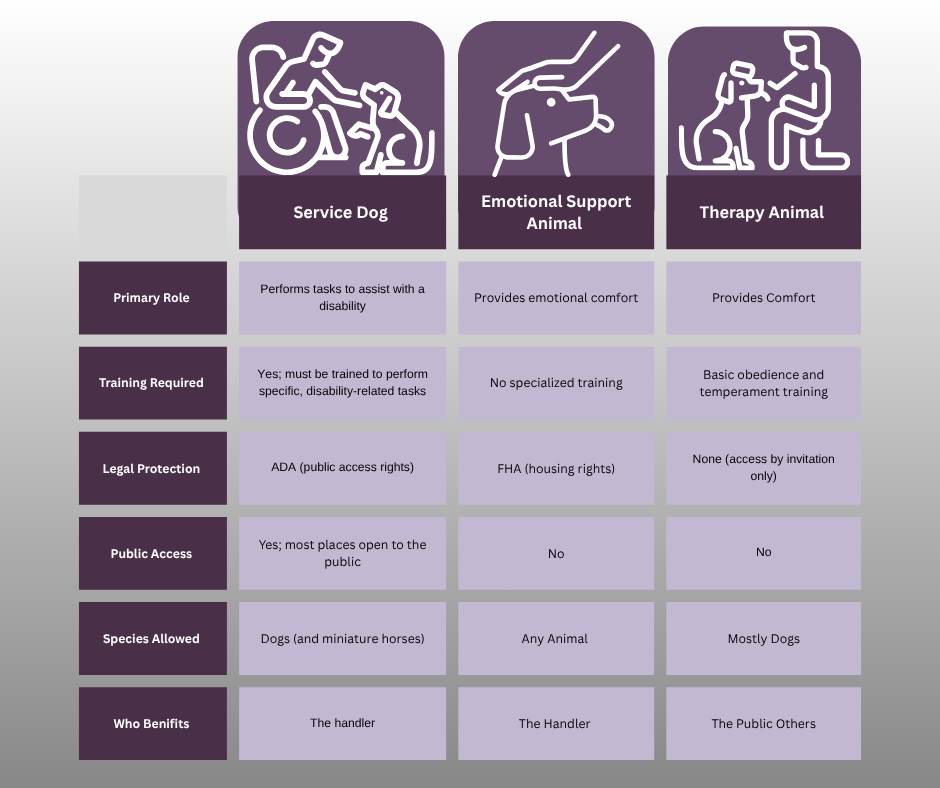Understanding the Difference Between Service Dogs, Emotional Support Animals, and Therapy Dogs

Animals bring comfort, connection, and support to our lives in countless ways. But when it comes to service dogs, emotional support animals (ESAs), and therapy dogs the differences can be confusing. Whether you’re a landlord, an employer, or someone who relies on animal assistance yourself, understanding these distinctions is essential.
At Evolved Law, we often work with clients navigating these issues, from housing and workplace disputes to questions about access rights or discrimination. Here’s what you need to know about how the law defines and protects each type of animal.
1. Service Dogs: Trained to Perform Specific Tasks
A service dog is specially trained to perform one or more tasks directly related to a person’s disability. These tasks go beyond companionship. They are specific, purposeful actions that actively mitigate a disability’s impact.
Examples of Service Dog Tasks
- Guiding a person who is blind or has low vision
- Alerting someone who is deaf or hard of hearing to sounds
- Pulling a wheelchair or providing balance assistance
- Detecting changes in blood sugar or alerting to seizures
- Interrupting self-harming behavior in individuals with PTSD or autism
Legal Protections
Under the Americans with Disabilities Act (ADA), service dogs have broad public access rights. Service dogs are allowed in nearly all public spaces — restaurants, stores, offices, and government buildings, even where pets are normally not allowed. Additionally, Colorado Law protects the rights of service dogs in training to accompany their handler anywhere a fully trained service dog would be able to go.
Business owners and employees can only ask two limited questions:
- Is the dog required because of a disability?
- What work or task has the dog been trained to perform?
Businesses cannot ask for documentation, proof of training, or details about the person’s disability.
Important Notes
- Only dogs (and sometimes miniature horses) qualify as service animals under the ADA. There are different and specific rules for Miniature horses, which can be found here.
- The dog must be trained to take specific actions, not just provide comfort or companionship.
- The animal must remain under control and well-behaved in public at all times.
Common Misunderstandings
A frequent misconception is that any dog providing comfort or helping emotionally qualifies as a service animal. That’s not the case. A dog must be individually trained to do work or perform tasks for someone with a disability. Comfort alone does not meet the ADA standard.
2. Emotional Support Animals (ESAs): Providing Comfort
An Emotional Support Animal offers therapeutic benefit through their presence and companionship. Unlike service dogs, ESAs do not need specialized task training. Their role is to provide emotional comfort that helps mitigate symptoms of mental or emotional disabilities such as anxiety, depression, or PTSD. An ESA animal is not limited by species or training; any type of animal can qualify as an ESA. However, ESA's are distinct from an average pet because they must be "prescribed" by a mental health or other medical professional and must provide a benefit specific to
Legal Protections
ESAs are not covered by the ADA, so they do not have the same access rights as service dogs. This means an ESA can be legally excluded from restaurants, stores, and workplaces that don’t allow pets.
However, they are protected under housing laws; specifically, the Fair Housing Act (FHA). Under the FHA:
- Housing providers must make reasonable accommodations for individuals with ESAs, even in “no-pet” housing.
- Landlords cannot charge pet fees or deposits for ESAs.
- A tenant must provide reliable documentation from a licensed healthcare provider stating that they have a disability and that the animal provides support that alleviates symptoms of that disability.
Air Travel Note
In recent years, airlines have changed their rules. ESAs are no longer guaranteed access to the cabin under federal law. Many airlines now treat ESAs as pets and may charge fees or have separate policies.
Important Distinctions
While ESAs play an incredibly meaningful role in emotional wellness, they do not have the same public access or training requirements as service animals. Their legal rights primarily relate to housing, not general public spaces.
3. Therapy Dogs: Visiting and Comforting Others
A therapy dog is trained to provide comfort, affection, and emotional support to people other than their handler. You often see therapy dogs
visiting hospitals, schools, nursing homes, or counseling centers to reduce stress and promote healing.
Therapy dogs are sometimes certified through organizations that evaluate their temperament and manners, but their training focuses on socialization and calm behavior rather than specific disability-related tasks.
Legal Protections
Unlike service dogs or ESAs, therapy dogs do not have any special access rights under federal law. Their ability to enter certain places — like hospitals or schools — comes from the institution’s permission, not from federal protection.
For example:
- A hospital can allow therapy dogs as part of a volunteer program.
- A business can permit therapy visits, but it’s optional.
- A landlord or airline does not have to accommodate a therapy dog under the ADA or FHA.
Key Role in the Community
Though they lack legal privileges, therapy dogs play an invaluable role in community well-being. They help calm children during court testimony, reduce stress for medical patients, and provide comfort to trauma survivors or students in crisis.

4. Why the Distinction Matters
Understanding these categories isn’t just about compliance. It’s about respecting both people and animals. Confusing ESAs or therapy dogs for service dogs can lead to access challenges for those who rely on legitimate service animals.
When untrained animals are misrepresented as service dogs, it can create unsafe situations and fuel public mistrust. This can make it harder for people with disabilities to assert their legal rights.
For landlords and businesses, knowing the law prevents accidental discrimination and avoids costly disputes. For individuals with disabilities, understanding your rights helps ensure fair treatment and appropriate accommodation.
5. Navigating Legal Disputes and Misunderstandings
Unfortunately, confusion about these categories often leads to legal conflict — a landlord denying housing, a business refusing entry, or an employee facing workplace pushback.
At Evolved Law, we help clients:
- Address housing denials or discrimination involving service animals or ESAs
- Handle public accommodation disputes under the ADA
- Advocate for reasonable accommodations in workplaces or schools
- Clarify documentation and compliance obligations for landlords, property managers, and employers
Our goal is to protect both the rights of individuals and the well-being of the animals that support them.
6. The Evolved Perspective
Animals play deeply meaningful roles in people’s lives, especially when living with a disability or emotional challenge. At Evolved Law, we believe in a compassionate and balanced approach, one that honors the human-animal bond while respecting legal boundaries and community safety.
If you’re facing a dispute or uncertainty about service animal or ESA rights, you don’t have to navigate it alone. Our experienced team can help you understand your rights, communicate effectively with landlords or businesses, and protect your relationship with your animal.
Disclaimer
The information provided in this blog is for general educational and informational purposes only. It is not intended as, and should not be taken as, legal advice. Reading this post, commenting on it, or contacting Evolved Law through this website does not create an attorney–client relationship.
Because every situation is unique, you should consult with a qualified attorney about your specific circumstances before making any legal decisions.
Need help with an animal law issue?
We represent clients across Colorado in service-animal discrimination, ESA housing disputes, and other animal-related legal matters.
Contact Evolved Law today to schedule a consultation and learn how we can help protect your rights — and your bond with your animal.











